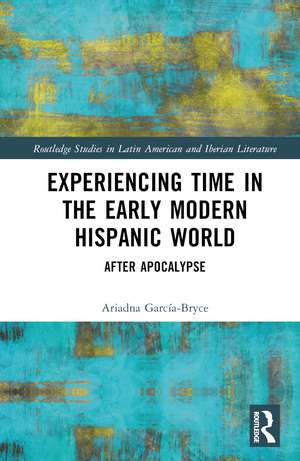Experiencing Time in the Early Modern Hispanic World: After Apocalypse: Routledge Studies in Latin American and Iberian Literature
Autor Ariadna García-Bryceen Limba Engleză Hardback – 20 sep 2023
Preț: 1002.32 lei
Preț vechi: 1222.35 lei
-18% Nou
Puncte Express: 1503
Preț estimativ în valută:
191.81€ • 200.51$ • 162.09£
191.81€ • 200.51$ • 162.09£
Carte tipărită la comandă
Livrare economică 06-20 martie
Preluare comenzi: 021 569.72.76
Specificații
ISBN-13: 9781032463711
ISBN-10: 1032463716
Pagini: 192
Ilustrații: 3 Halftones, black and white; 3 Illustrations, black and white
Dimensiuni: 152 x 229 x 13 mm
Greutate: 0.51 kg
Ediția:1
Editura: Taylor & Francis
Colecția Routledge
Seria Routledge Studies in Latin American and Iberian Literature
Locul publicării:Oxford, United Kingdom
ISBN-10: 1032463716
Pagini: 192
Ilustrații: 3 Halftones, black and white; 3 Illustrations, black and white
Dimensiuni: 152 x 229 x 13 mm
Greutate: 0.51 kg
Ediția:1
Editura: Taylor & Francis
Colecția Routledge
Seria Routledge Studies in Latin American and Iberian Literature
Locul publicării:Oxford, United Kingdom
Public țintă
PostgraduateCuprins
Acknowledgments
INTRODUCTION: TIME IN EARLY MODERNITY
"Scattered in Times"
Time as Scythe
Chronos Resurrected
Chapter Overview
CHAPTER ONE:
Embracing Clock Time in Loyola’s Spiritual Exercises
Scheduled Devotion
Transcending Vanitas
Augustine: Time as a Problem
Achieving Duration
The Presence of Memory
CHAPTER TWO:
TIME TROUBLES IN TERESA OF ÁVILA’S LIBRO DE LA VIDA
"We are not angels"
Alumbradismo as Rejection of Time
Schooling Memory
The Time which is not One: Lux et Brevitas
CHAPTER THREE:
PIOUS SUBJECTS FOR A POST-MILLENARIAN NEW SPAIN
The Imperfect Conquest of Time
Mendieta’s Historia eclesiástica indiana: The End of Kairos
Gregorio López: Seizing Timelessness
Temporalizing the Life of Gregorio López
CHAPTER FOUR:
A NEW NEW JERUSALEM: SIGÜENZA Y GÓNGORA’S PARAÍSO OCCIDENTAL
Resignifying Baroque Space
The City as a Place of Memory
The Christic Bodies of the Patria
CHAPTER FIVE:
REDEEMED TEMPORALITY: THE INFINITE SELF IN SOR JUANA’S "PRIMERO SUEÑO"
Dreaming Wonder
The Permanence of Change
Resisting Allegory
Awakening
Solar Time
EPILOGUE
BIBLIOGRAPHY
INDEX
INTRODUCTION: TIME IN EARLY MODERNITY
"Scattered in Times"
Time as Scythe
Chronos Resurrected
Chapter Overview
CHAPTER ONE:
Embracing Clock Time in Loyola’s Spiritual Exercises
Scheduled Devotion
Transcending Vanitas
Augustine: Time as a Problem
Achieving Duration
The Presence of Memory
CHAPTER TWO:
TIME TROUBLES IN TERESA OF ÁVILA’S LIBRO DE LA VIDA
"We are not angels"
Alumbradismo as Rejection of Time
Schooling Memory
The Time which is not One: Lux et Brevitas
CHAPTER THREE:
PIOUS SUBJECTS FOR A POST-MILLENARIAN NEW SPAIN
The Imperfect Conquest of Time
Mendieta’s Historia eclesiástica indiana: The End of Kairos
Gregorio López: Seizing Timelessness
Temporalizing the Life of Gregorio López
CHAPTER FOUR:
A NEW NEW JERUSALEM: SIGÜENZA Y GÓNGORA’S PARAÍSO OCCIDENTAL
Resignifying Baroque Space
The City as a Place of Memory
The Christic Bodies of the Patria
CHAPTER FIVE:
REDEEMED TEMPORALITY: THE INFINITE SELF IN SOR JUANA’S "PRIMERO SUEÑO"
Dreaming Wonder
The Permanence of Change
Resisting Allegory
Awakening
Solar Time
EPILOGUE
BIBLIOGRAPHY
INDEX
Notă biografică
Ariadna García-Bryce earned a BA in Comparative Literature from Yale a PhD in Spanish Literature from Princeton. Her publications, which include Transcending Textuality: Quevedo and Political Authority in the Age of Print (2011) and many articles published in distinguished peer-reviewed journals (e.g. Renaissance Studies, Bulletin of Hispanic Studies, Revista de estudios hispánicos, Journal of Spanish Cultural Studies, Hispanic Review), have focused on a variety of topics within early modern Hispanism: the relationship between drama, religion, and painting; rhetoric and poetics; modern appropriations of Baroque aesthetics; gender representation; the connection between literary culture and incipient bureaucratization.
Descriere
This book considers the new ways time was experienced in the 16th- and 17th-century Hispanic world in the framework of global Catholicism. It examines how authors adapt Christ-centered conceptions of existence to accommodate both a volatile post-eschatological world and the increased dominance of mechanical clock time.












